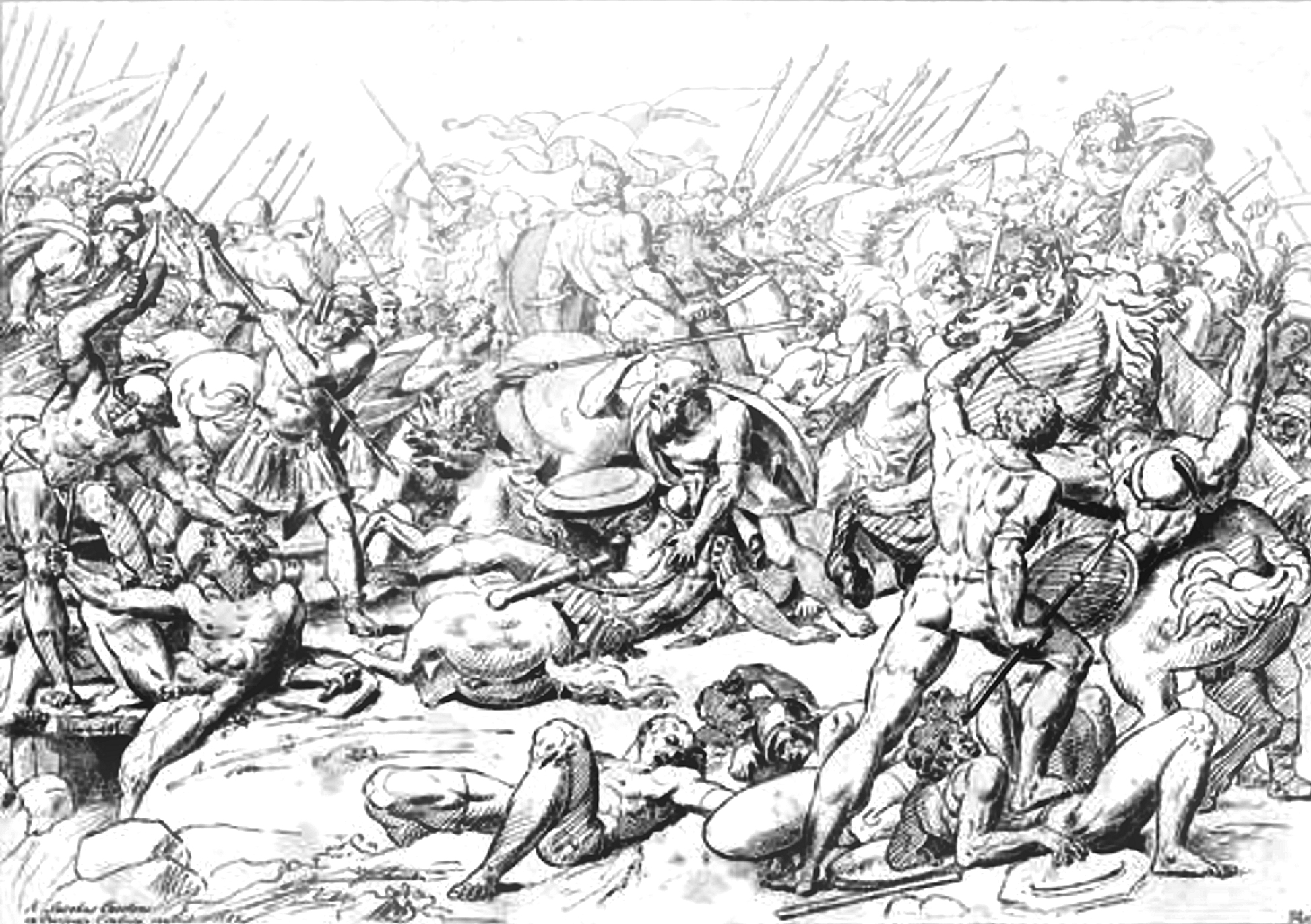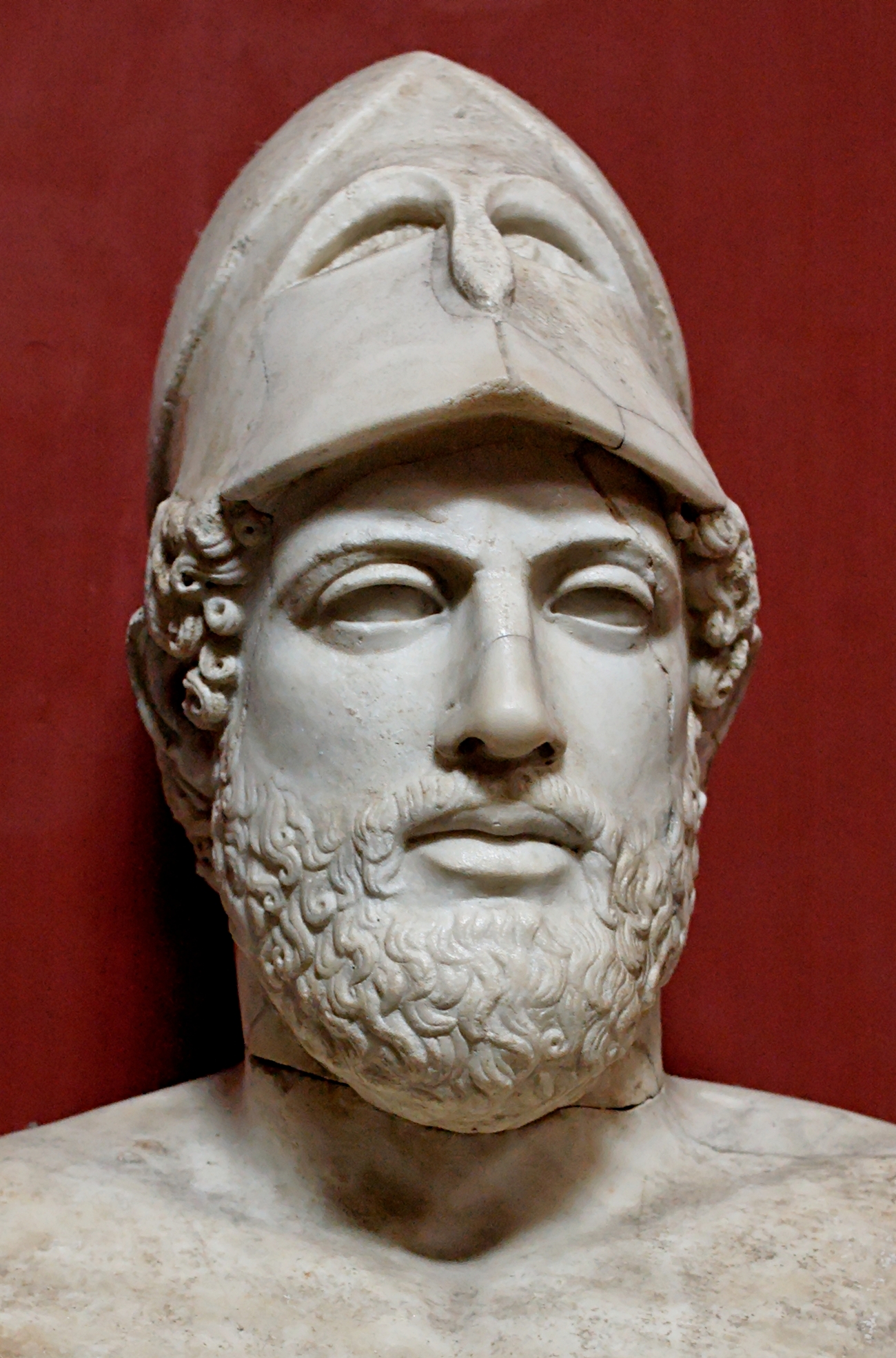|
Pentecontaetia
''Pentecontaetia'' (, "the period of fifty years") is the term used to refer to the period in Ancient Greek history between the defeat of the second Persian invasion of Greece at Plataea in 479 BC and the beginning of the Peloponnesian War in 431 BC. The term originated with a scholiast commenting on Thucydides, who used it in their description of the period. The ''Pentecontaetia'' was marked by the rise of Athens as the dominant state in the Greek world and by the rise of Athenian democracy, a period also known as Golden Age of Athens. Since Thucydides focused his account on these developments, the term is generally used when discussing developments in and involving Athens. Shortly after the Greek victory of 479 BC, Athens assumed the leadership of the Delian League, a coalition of states that wished to continue the war against Persia. This league experienced a number of successes and was soon established as the dominant military force of the Aegean. Athenian control over ... [...More Info...] [...Related Items...] OR: [Wikipedia] [Google] [Baidu] |
Peloponnesian War
The Second Peloponnesian War (431–404 BC), often called simply the Peloponnesian War (), was an Ancient Greece, ancient Greek war fought between Classical Athens, Athens and Sparta and their respective allies for the hegemony of the Ancient Greece, Greek world. The war remained undecided until the later intervention of the Achaemenid Empire, Persian Empire in support of Sparta. Led by Lysander, the Spartan fleet (built with Persian subsidies) finally defeated Athens which began a period of Spartan hegemony over Greece. Historians have traditionally divided the war into three phases. The first phase (431–421 BC) was named the Ten Years War, or the Archidamian War, after the Spartan king Archidamus II, who invaded Attica several times with the full hoplite army of the Peloponnesian League, the alliance network dominated by Sparta (then known as Lacedaemon). The Long Walls of Athens rendered this strategy ineffective, while the superior navy of the Delian League (Athens' all ... [...More Info...] [...Related Items...] OR: [Wikipedia] [Google] [Baidu] |
Fifth-century Athens
Fifth-century Athens was the Greek city-state of Athens in the time from 480 to 404 BC. Formerly known as the Golden Age of Athens, the latter part being the Age of Pericles, it was buoyed by political hegemony, economic growth and cultural flourishing. The period began in 478 BC, after the defeat of the Persian invasion, when an Athenian-led coalition of city-states, known as the Delian League, confronted the Persians to keep the liberated Asian Greek cities free. After peace was made with Persia in the mid-5th century BC, what started as an alliance of independent city-states became an Athenian empire after Athens abandoned the pretense of parity among its allies and relocated the Delian League treasury from Delos to Athens, where it funded the building of the Athenian Acropolis, put half its population on the public payroll, and maintained its position as the dominant naval power in the Greek world. With the empire's funds, military dominance and its political fortunes gu ... [...More Info...] [...Related Items...] OR: [Wikipedia] [Google] [Baidu] |
Delian League
The Delian League was a confederacy of Polis, Greek city-states, numbering between 150 and 330, founded in 478 BC under the leadership (hegemony) of Classical Athens, Athens, whose purpose was to continue fighting the Achaemenid Empire, Persian Empire after the Greek victory in the Battle of Plataea at the end of the Second Persian invasion of Greece. The League functioned as a dual –offensive and defensive– alliance (''Symmachia (alliance), symmachia'') of autonomous states, similar to its rival association, the Peloponnesian League. The League's modern name derives from its official meeting place, the island of Delos, where congresses were held within the sanctuary of the Temple of Apollo; contemporary authors referred to the organization simply as "the Athenians and their Allies". While Sparta excelled as Greece's greatest power on land, Athens turned to the seas becoming the dominant naval power of the Ancient Greece, Greek world. Following Sparta's withdrawal from the Gr ... [...More Info...] [...Related Items...] OR: [Wikipedia] [Google] [Baidu] |
Map Athenian Empire 431 BC-en
A map is a symbolic depiction of interrelationships, commonly spatial, between things within a space. A map may be annotated with text and graphics. Like any graphic, a map may be fixed to paper or other durable media, or may be displayed on a transitory medium such as a computer screen. Some maps change interactively. Although maps are commonly used to depict geography, geographic elements, they may represent any space, real or fictional. The subject being mapped may be two-dimensional such as Earth's surface, three-dimensional such as Earth's interior, or from an abstract space of any dimension. Maps of geographic territory have a very long tradition and have existed from ancient times. The word "map" comes from the , wherein ''mappa'' meant 'napkin' or 'cloth' and ''mundi'' 'of the world'. Thus, "map" became a shortened term referring to a flat representation of Earth's surface. History Maps have been one of the most important human inventions for millennia, allowin ... [...More Info...] [...Related Items...] OR: [Wikipedia] [Google] [Baidu] |
Thirty Years' Peace
The Thirty Years' Peace was a treaty signed between the ancient Greek city-states of Athens and Sparta in 446/445 BC. The treaty brought an end to the conflict commonly known as the First Peloponnesian War, which had been raging since c. 460 BC. Background The purpose of the treaty was to prevent another outbreak of war. Ultimately, the peace treaty failed in achieving its goal, with the outbreak of the Second Peloponnesian War in 431 BC. Athens was forced to give up all possessions in the Peloponnese, which included the Megarian ports of Nisaea and Pagae with Troezen and Achaea in Argolis, but the Spartans agreed to allow the Athenians to keep Naupactus. It also ruled out armed conflict between Sparta and Athens. Neutral poleis could join either side, Sparta or Athens, which implies that there was a formalized list of allies for each side. Athens and Sparta would keep all other territories pending arbitration. It also recognised both Leagues as legitimate, a boost for Athens and ... [...More Info...] [...Related Items...] OR: [Wikipedia] [Google] [Baidu] |
Corcyra
Corfu ( , ) or Kerkyra (, ) is a Greece, Greek island in the Ionian Sea, of the Ionian Islands; including its Greek islands, small satellite islands, it forms the margin of Greece's northwestern frontier. The island is part of the Corfu (regional unit), Corfu regional unit, and is administered by three municipalities with the islands of Othonoi, Ereikoussa, and Mathraki. The principal city of the island (pop. 32,095) is also named Corfu (city), Corfu. Corfu is home to the Ionian University. The island is bound up with the history of Greece from the beginnings of Greek mythology, and is marked by numerous battles and conquests. Ancient Korkyra (polis), Korkyra took part in the Battle of Sybota which was a catalyst for the Peloponnesian War, and, according to Thucydides, the largest naval battle between Greek city states until that time. Thucydides also reports that Korkyra was one of the three great naval powers of Greece in the fifth century BCE, along with Classical Athens, At ... [...More Info...] [...Related Items...] OR: [Wikipedia] [Google] [Baidu] |
Potidaea
__NOTOC__ Potidaea (; , ''Potidaia'', also Ποτείδαια, ''Poteidaia'') was a colony founded by the Corinthians around 600 BC in the narrowest point of the peninsula of Pallene, Chalcidice, Pallene, the westernmost of three peninsulas at the southern end of Chalcidice in northern Greece.POTEIDAIA (Nea Poteidaia) Chalkidike, Greece entry in The Princeton Encyclopedia of Classical Sites. History While besieged by the Persian Empire, Persians in 479 BC, the town may have been saved by a 479 BC Potidaea earthquake, tsunami rather than a particularly high tide. Herodotus reports how the Persian attackers who tried to exploit an unusual retreat of the water were suddenly surprised by "a great flood-tide, higher, as the people of the place s ...[...More Info...] [...Related Items...] OR: [Wikipedia] [Google] [Baidu] |
Corinth
Corinth ( ; , ) is a municipality in Corinthia in Greece. The successor to the ancient Corinth, ancient city of Corinth, it is a former municipality in Corinthia, Peloponnese (region), Peloponnese, which is located in south-central Greece. Since the 2011 local government reform, it has been part of the Corinth (municipality), municipality of Corinth, of which it is the seat and a municipal unit. It is the capital of Corinthia. It was founded as Nea Korinthos (), or New Corinth, in 1858 after an earthquake destroyed the existing settlement of Corinth, which had developed in and around the site of the ancient city. History Corinth derives its name from Ancient Corinth, a city-state of antiquity. The site was occupied from before 3000 BC. Ancient Greece Historical references begin with the early 8th century BC, when ancient Corinth began to develop as a commercial center. Between the 8th and 7th centuries, the Bacchiad family ruled Corinth. Cypselus overthrew the Bacchiad f ... [...More Info...] [...Related Items...] OR: [Wikipedia] [Google] [Baidu] |
First Peloponnesian War
The First Peloponnesian War (460–445 BC) was fought between Sparta as the leaders of the Peloponnesian League and Sparta's other allies, most notably Thebes, and the Delian League led by Athens with support from Argos. This war consisted of a series of conflicts and minor wars, such as the Second Sacred War. There were several causes for the war including the building of the Athenian long walls, Megara's defection and the envy and concern felt by Sparta at the growth of the Athenian Empire. The First Peloponnesian War began in 460 BC with the Battle of Oenoe, where Spartan forces were defeated by those of Athenian-Argive alliance. At first the Athenians had the better of the fighting, winning the naval engagements using their superior fleet. They also had the better of the fighting on land, until 457 BC when the Spartans and their allies defeated the Athenian army at Tanagra. The Athenians, however, counterattacked and scored a crushing victory over the Boeotians at the ... [...More Info...] [...Related Items...] OR: [Wikipedia] [Google] [Baidu] |
Fragment Of The Athenian Tribute List, 425-424 BCE
Fragment(s) may refer to: Computing and logic * Fragment (computer graphics), all the data necessary to generate a pixel in the frame buffer * Fragment (logic), a syntactically restricted subset of a logical language * URI fragment, the component of a URL following the "#" that identifies a portion of a larger document Film and television * Fragments (film), ''Fragments'' (film), or ''Winged Creatures'', a 2008 American film * ''Fragments: Chronicle of a Vanishing'', a 1991 Croatian film * The Fragment (Dynasty), "The Fragment" (''Dynasty''), a 1982 TV episode * Fragments (Magnum, P.I.), "Fragments" (''Magnum, P.I.''), a 1984 TV episode * Fragments (Sanctuary), "Fragments" (''Sanctuary''), a 2009 TV episode * Fragments (Steven Universe Future), "Fragments" (''Steven Universe Future''), a 2020 TV episode * Fragments (Torchwood), "Fragments" (''Torchwood''), a 2008 TV episode Literature and writing * Literary fragment, a brief or unfinished work of prose * Manuscript fragment, a ... [...More Info...] [...Related Items...] OR: [Wikipedia] [Google] [Baidu] |




